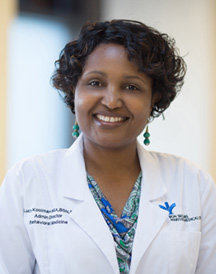Administrative Director, Behavioral Health
Bon Secours Maryview Medical Center
 When Lucy Kooiman was in the BSN program at Norfolk State University (2008, summa cum laude), she was frequently scolded by her teachers for spending too much time with her hospital patients. But she wanted to hear how they were doing, and to know how they came to be came to be so sick. Mostly, she wanted to help them learn what they could do differently when they got home, so they wouldn’t have to return to the hospital.
When Lucy Kooiman was in the BSN program at Norfolk State University (2008, summa cum laude), she was frequently scolded by her teachers for spending too much time with her hospital patients. But she wanted to hear how they were doing, and to know how they came to be came to be so sick. Mostly, she wanted to help them learn what they could do differently when they got home, so they wouldn’t have to return to the hospital.
“One teacher told me I’d never make it in nursing if I kept asking patients all those questions,” she remembers. “They told me to do a head-to-toe assessment, get it over with and move on to the next patient. But I wanted to talk with these people, hold their hands if they needed me to, and help them if I could. Unfortunately, in most hospital nursing, time constraints make it very hard to do that.”
It was different when she took the rotation for behavioral medicine, where talking and listening to her patients was not just permitted, but her principal task. She found she had a natural affinity for these patients, and a profound desire to help them.
Throughout college and graduate school (Central Michigan University, 2008), she sought employment (and volunteer opportunities) that would allow her to serve the un- and underserved populations suffering from mental health conditions. She worked with virtually every demographic: as a counselor at the YWCA Women in Crisis Center, as a geriatric psychiatric nurse with Diamond Health Corporation, as the night nurse supervisor at a 120-bed private psychiatric residential facility for adolescents, as the charge nurse in Maryview’s child and adolescent unit, and as nurse manager for Behavioral Health at Maryview Medical Center.
In 2011, she undertook the interim directorship of Behavioral Health, and was named permanent Administrative Director in 2012. In that capacity, Kooiman has overseen the development and implementation of business operations for the 54-bed inpatient unit, which includes supervision nearly 100 employees, from RNs to social workers, therapists, mental health technicians, crisis workers and clerical personnel. She manages the departmental budget, identifies and grows new community partnerships and deals with contract physicians.
Even with all of her administrative responsibilities, Kooiman is still keenly interested in the outcomes of individual patients. “The majority of our patients are disadvantaged in a number of ways,” she explains. “It goes beyond their illness: they have socioeconomic challenges, they’re homeless. They have no voice.” She makes sure that every patient leaves better off than when he or she was admitted, right down to ensuring they are properly dressed. “We have a closet here, where we keep donated clothing that we can give to those patients who need it. Often they come in in disarray, but we want them to leave with pride and dignity.”
Kooiman describes with pride a recent accomplishment: a grant was written that enabled Maryview to provide a dedicated nurse practitioner to do mental health assessments for clinic patients. “So many people who are dealing with serious illness aren’t aware that they also have depression or anxiety,” she says. “This will help us treat these patients’ mental and physical health conditions.”
And while she doesn’t have as much time for hands-on bedside patient care as she used to, Kooiman can still be found on the floor if the need arises, donning gloves to assist with whatever needs to be done. As she says, “Once you’re a nurse, you never stop being a nurse. The priority is always taking care of patients.”

